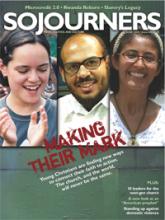From mid-January to mid-March, I traveled to 22 cities on my Great Awakening book tour. The most compelling evidence I saw that we really are entering a “post-Religious Right America” is the shifting political agenda and theological emphasis of a new generation of twentysomething evangelicals. I met thousands of them on the road as they came out in large numbers for book events.
I travel with one of these young evangelicals, Chris LaTondresse, a missionary kid who grew up in the former Soviet Union and who recently graduated from Bethel University in St. Paul, Minnesota. From the conversations he and I have been having with those in attendance at book events, churches, and evangelical college campuses, it’s clear that churchgoers growing up in conservative pews are finally coming of age with regard to peace and justice issues. This emerging generation is the leading edge of a new movement of progressive evangelicals.
In Boston, I spoke at the historic Park Street Church, where the premier evangelist of the Second Great Awakening, Charles Finney, preached in 1831. The Billy Graham of his day, Finney called people to faith in Jesus Christ and then to enlist in the anti-slavery campaign. Finney actually pioneered the “altar call” so he could sign up his converts for the anti-slavery campaign. Another famous anti-slavery crusader of the time, the more secular William Lloyd Garrison, delivered his first abolitionist speech in the same church when he was only 23 years old.
On that weekday night at Park Street, I encountered a packed church of hundreds of young evangelicals who want to be a generation of new “abolitionists”—focusing on the most vulnerable people in our world today. They suspect that Jesus would likely care about the 30,000 children around the world who die each day due to unnecessary poverty and preventable disease.
Read the Full Article
